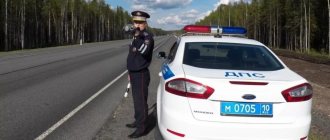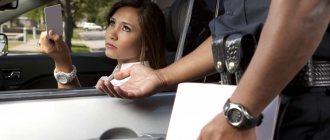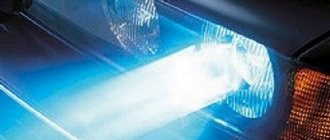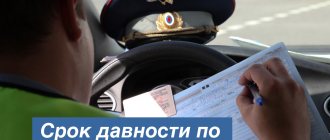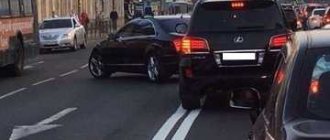Deprivation of documents for drunk driving 3 times
Situations when a driver is deprived of his license for the third time for driving while intoxicated do not arise so often. Therefore, there is no separate legislative provision for such cases. However, according to Article 32.7 of the Code of Administrative Offenses, there is a procedure established for the execution of this punishment (deprivation of military license), taking into account the effect of previously taken measures.
A citizen whose license was taken away for the third time for drunkenness is punished with a new term, but its calculation begins after the end of the previous one. Amendments are currently being developed to be introduced into the Criminal Code and the Code of Administrative Offenses, which will regulate this issue.
Criminal liability
The most severe consequences face those violators who drive a car while intoxicated. Moreover, they have already been subjected to administrative violation for a similar offense.
There is nothing provided by law for the repeated confiscation of a driver's license if a year has already passed since the date of return of rights for the previous offense. In other words, from the moment the execution of the decision on the appointment of administrative punishment is completed.
It is at this moment that the person ceases to be subject to administrative punishment. We are talking about criminal liability under Art. 264.1 of the Criminal Code of the Russian Federation. According to it, a fine is imposed, the amount of which is 200-300 thousand rubles. also be sentenced to compulsory or forced labor or imprisonment for 2 years. What type of punishment to apply is decided by the district court, not the magistrate, in accordance with No. 509-FZ of December 27, 2018.
When making a decision, the judge takes into account certain circumstances. In addition, the violator’s license must be confiscated for up to 3 years.
Repeated seizure for alcohol
By relapse, or repeated violation of the rules of driving (in particular, drunk driving) is meant the fact of “drunk driving” that occurred within a year from the end of the previous deprivation of rights or during its validity.
This fact must be documented by the inspector in the protocol and by the doctor in the medical examination report.
If a drunk driver is caught after the specified period has expired, this will not be considered a repeated deprivation of rights, therefore, the punishment is different.
Sanctions for repeated driving while intoxicated are determined by Article 264.1 of the Criminal Code:
- a fine of 200-300 thousand rubles or in the amount of wages or in the amount of other income for 1-2 years; prohibition from holding certain positions and conducting certain activities for three years;
- 480 hours of compulsory work, as well as a ban on performing certain work and conducting certain activities for up to three years;
- up to two years of forced labor, a ban on holding certain positions and engaging in certain types of activities;
- imprisonment for up to two years, ban on engaging in certain types of activities.
Regardless of what punishment the court decided in favor of, the drunk driver will also have to bear administrative responsibility. The citizen will again lose his ID for a period of three years.
How to avoid being deprived a third time
It is naive to believe that the absence of rights, in principle, will save you from responsibility. If the offender does not have a license at all, then for the third time driving while intoxicated, he may be subject to a fine, correctional labor and imprisonment. In addition, driving without documents will be punishable under Art. 12.7 of the Administrative Code, and this is a fine of 5-15 thousand. The inspector himself appoints him.
You will not be able to avoid deprivation either the first or the third time you drive drunk. This applies to cases brought to court. This is due to the fact that such driving is accompanied by high risks and must be stopped in a timely manner. However, in a number of situations, deprivation can be avoided if:
- Lack of witnesses or as an alternative to camera recording. This factor calls into question the fact of the incident and the reliability of the data presented.
- Violation of inspection rules. For example, the document was not signed by the doctor who performed the procedure. The form issued by an unlicensed clinic will also be considered invalid.
- There is no crime. If there is no violator and guilt, illegal action or inaction, then there is no one or nothing to punish.
In any case, the court's decision can be challenged. 10 days are given for this.
If the term of the previous offense has not expired?
Much depends on whether the previous sentence has expired at the time of the reoffense.
You can count on a more loyal attitude if more than a year has passed since the return of your driver’s license.
We are talking not only about driving while intoxicated, but also about other violations of current rules:
- over speed;
- leaving the scene of an accident;
- driving into the oncoming lane;
- causing harm to pedestrian(s) as a result of violation of the rules;
- refusal of medical examination;
- other offenses.
For example, if the speed limit is violated again, a citizen faces deprivation of rights for a period of one year (for the first violation, the maximum period is six months) . Sanctions are also being tightened on other points.
How can they punish?
The third and subsequent facts of confiscation of a driver’s license and the right to drive a car do not threaten lifelong deprivation of rights. Such a measure continues to be considered by the government, but is not currently being implemented.
A proposal was also put forward to create a unified register of “dangerous” drivers - citizens who pose a potential danger as road users.
But all these projects are still at the stage of development and discussion. Currently, there is not even a separate article provided for in case of deprivation of rights for the third time. The reason is due to the fact that there are not many such cases in practice.
Deprivation of rights
Automotive lawyerDeprivation of driver's license
Experienced lawyers will be able to prevent deprivation of rights even in the most difficult cases.
Check out examples of won cases in the following areas:
- refusal of medical examination;
- driving while intoxicated;
- leaving the scene of an accident;
- driving into oncoming traffic.
Revocation of a driver's license may result for the following violations:
| Article of the Administrative Code | Violation | Fine (rub.) | Deprivation of rights |
| Art. 12.1. clause 1.1. | Repeated driving of a vehicle that has not passed registration and technical inspection in accordance with the established procedure. | 5000 | Deprivation of rights for 1-3 months. |
| Art. 12.2 clause 2 | Driving a car without state signs, or installed with violations and with equipment that allows them to be hidden or modified. | 5000 | Deprivation of rights for 1-3 months. |
| Art. 12.2 clause 4 | Driving a car with obviously false state license plates. | — | Deprivation of rights for 6-12 months. |
| Art. 12.5 clause 3 | Driving a car, the front part of which is equipped with lighting devices with red lights or reflective devices, the color and operating mode of which does not meet the requirements for vehicles to ensure road safety. | — | Deprivation of rights for 6-12 months. + confiscation of these devices and devices. |
| Art. 12.5 clause 4 | Driving a car with special light and sound signals installed without permission (excluding alarms) | — | Deprivation of rights for 12-18 months. + confiscation of these devices. |
| Art. 12.5 clause 5 | Driving a car using means for giving special sound or light signals without the appropriate permission. | — | Deprivation of rights for 18-24 months. |
| Art. 12.5 p.6 | Driving a car with illegally applied special color schemes of emergency services vehicles. | — | Deprivation of rights for 12-18 months. |
| Art. 12.8 p.1 | Driving while drunk (if the actions are not criminally punishable) | 30000 | Deprivation of rights for 18-24 months. |
| Art. 12.8 clause 2 | Transferring control of a car to a person who is drunk. | 30000 | Deprivation of rights for 18-24 months. |
| Art. 12.9 p.4 | Exceeding the permitted speed limit by 60-80 km/h. | 2-2.5 thousand rubles | Deprivation of rights for 4-6 months. |
| Art. 12.9 p.5 | Exceeding the speed limit by more than 80 km/h | 5000 rub. | Or Deprivation of rights for up to 6 months. |
| Art. 12.9 p.7 | Repeatedly exceeding the speed limit by 60-80 km/h and by more than 80 km/h. | If caught by cameras, the fine is RUR 5,000. | Deprivation of rights for 12 months. |
| Art. 12.10 p.1 | Crossing a railway crossing in violation of the rules. | 1000 | Deprivation of rights for 3-6 months. |
| Art. 12.10 clause 3 | Repeatedly crossing a railway crossing in violation of the rules. | — | Deprivation of rights for 12 months. |
| Art. 12.12 p.3 | Repeated driving through a prohibiting traffic light signal or a traffic controller's gesture | 5000 | Deprivation of rights for 4-6 months. |
| Art. 12.15 p.4 | Driving into the lane or tram tracks of oncoming traffic. | 5000 | Deprivation of rights for 4-6 months. |
| Art. 12.15 p.5 | Repeated entry into the lane or tram tracks of oncoming traffic. | In case of recording by cameras - 5000 | Deprivation of rights for 12 months. |
| Article 12.6 clause 3 | Driving in the opposite direction on a one-way road. | 5000 | Deprivation of rights for 4.6 months. |
| Art. 12.16 p.4 | Repeatedly driving in oncoming traffic on a one-way road. | In case of recording by cameras - 5000 | Deprivation of rights for 12 months. |
| Article 12.17 clause 2 | Failure to provide priority in traffic to vehicles with special sound signals, flashing lights and inscriptions. | 500 rub. | Deprivation of rights for 1-3 months. |
| Art. 12.21.1 clause 3 | Driving large or heavy vehicles exceeding the permissible dimensions by 20-50 cm or the weight (load) on the axle by 20-50% without special permission. | For the driver – 5000-10000 For officials – 35000-40000 For legal entities – 350000-400000 In case of recording by cameras – 400,000 for the owner | Deprivation of rights for 2-4 months. |
| Article 12.21.1 clause 6 | Driving large or heavy vehicles exceeding the permissible dimensions by more than 50 cm or the weight (load) on the axle by more than 50% without special permission. | For the driver – 7000-10000. For officials – 45,000-50,000. For legal entities – 400,000-500,000. In case of recording by cameras for the owner - 500,000. | Deprivation of rights for 4-6 months. |
| Article 12.21.2 clause 1 | Transportation of dangerous goods in violation of regulations. | For the driver – 2000-2500. For officials – 15,000-20,000. For legal entities – 400,000-500,000. | Deprivation of rights for 4-6 months. |
| Article 12.23 clause 5 | Violation of the rules when transporting children at night and organized transportation of groups of children by bus. | For the driver – 5000. For officials – 50,000. For legal entities – 200,000. | Deprivation of rights for 4-6 months. |
| Article 12.24 clause 1 | Violation of traffic rules causing minor harm to the victim's health. | 2500-5000 | Deprivation of rights for 12-18 months. |
| Article 12.24 clause 2 | Violation of traffic rules causing moderate harm to the victim's health. | 10000-25000 | Or Deprivation of rights for 18-24 months. |
| Article 12.26 clause 1 | Refusal of the driver to undergo a medical examination for alcohol intoxication. | 30000 | Deprivation of rights for 18-24 months. |
| Article 12.27 clause 2 | Leaving the scene of an accident by the driver. | Deprivation of rights for 12-18 months. | |
| Article 12.27 clause 3 | The driver’s use of alcohol, narcotic or psychotropic substances after an accident. | 30000 | Deprivation of rights for 18-24 months. |
Call us now and we will preserve your rights!
Check out an example of a won case in one of the most difficult areas:
Make sure right now that our consultations are free!
8 +7
You can also use the on-line form:
Consult for free
What is the punishment?
Article 4.6 of the Code of Administrative Offenses states that driving while intoxicated, which occurred earlier than a year after the end of the previous period, entails criminal liability.
Sanctions for such offenses are determined by Article No. 264.1 of the Criminal Code: large fines, forced labor and others (listed above).
The decision on what punishment will be assigned to the perpetrator is made only by the court based on the documents provided.
In general, the entire article 264 of the Criminal Code is devoted to violation of traffic rules. Parts 2, 4, 6 consider cases where the driver’s actions caused serious harm to health or the death of a person.
If several people become victims of an accident caused by a drunk driver, he faces up to 9 years in prison. The death of one person is punishable by imprisonment for 2-7 years.
The accused also faces a ban on conducting a certain type of activity or working in certain positions.
Third time deprivation of license for drunkenness, is it possible to avoid criminal prosecution?
Violation of traffic rules by a driver entails administrative and, in some cases, criminal liability.
However, punishment does not always serve as a serious motivation to avoid similar problems in the future. Therefore, repeated illegal actions are no longer viewed so favorably, and sanctions are becoming tougher.
Expert opinion Romanov Andrey Fedorovich Legal practitioner with 8 years of experience. Specialization: family law. Extensive experience in document examination.
Naturally, having violated the rules for the third time and being detained while drunk while driving a car, the driver cannot count on avoiding punishment or a minimum fine.
This is already considered a malicious violation, and it will be almost impossible to build an evidence base for justification.
Fine
The amount of the fine depends on how much time has passed since the last deadline was set. If 12 or more months have elapsed, sanctions are applied in accordance with Article 12.8 of the Code of Administrative Offenses. In particular, the driver will have to pay a fine of 30 thousand rubles and surrender his license.
The maximum period during which he will not be able to exercise his rights is two years.
In other cases, the actions of a drunk citizen driving a vehicle for the third and subsequent times are considered criminally punishable.
According to Article 264.1 of the Criminal Code, he will be punished in the form of:
- 200-300 thousand rubles fine;
- a fine in the amount of one year's salary;
- 480 hours of compulsory work;
- prohibition to conduct certain types of activities;
- 2 years of forced labor.
As noted, the decision on the punishment is made only by the court, taking into account the details of the case and the evidence presented.
Drunk driving with injuries
A driver should expect much more serious liability for repeated drunk driving if he caused an accident that resulted in injury or death. For example, in the event of the death of one person due to the driver, he will face criminal liability in the form of imprisonment for a term of 2 to 7 years and deprivation of a driver’s license for a period of up to 3 years (Article 264 of the Criminal Code of the Russian Federation).
In the event of the death of two or more people, the driver’s liability is even more stringent - imprisonment for up to 9 years. If the drunk driver’s guilt is not so serious, then instead of arrest he may face forced labor for up to 5 years and deprivation of his driver’s license for up to 3 years.
In 2021, penalties for drivers who repeatedly drive while intoxicated have become significantly harsher than they were just a few years ago. For example, under Article 264 of the Criminal Code of the Russian Federation, the punishment for drivers cannot be less than 4 years (now imprisonment can only be for a period of 4 to 9 years), whereas previously a driver could be sent to prison for only one or two years.
Not long ago, a new article 264.1 of the Criminal Code of the Russian Federation appeared, which introduced liability for repeated driving while drunk, including for refusal to undergo a medical examination. Therefore, now, in the best case scenario, the violator will face a fairly large fine - from 200 to 300 thousand rubles (previously the fine was only 50 thousand rubles).
Lifetime ban on driving
There is no article on lifelong deprivation of a driver’s license in Russian legislation. There are cases when the terms of punishment are summed up, and the result is an impressive period - 30, 50 or more years.
Heated debates continue in the State Duma over the bill on indefinite deprivation. Supporters of such punishment believe that this law will make the roads safe from drunk drivers once and for all. Opponents of the idea are confident that this will lead to increased corruption in the traffic police and citizens giving up cars.
Can they be deprived of their rights for life?
There is no corresponding article of law for life imprisonment. The minimum period is one month, and the maximum is 3 years. But the terms of deprivation do not cover each other, but accumulate. If, say, along with the third offense a person commits another offense that leads to deprivation, then the periods will be summed up. The penalty countdown for the second situation will begin after the end of the first period.
Important! Refusal of an examination, handing over the steering wheel to a drunk person are situations that are equivalent to drunk driving. If there was deprivation for these offenses, then at least a year must pass before the guilt was completely removed.
Prosecution procedure
The traffic police inspector draws up a report on the fact of driving a vehicle while intoxicated. The document records the circumstances of the incident, indicates the names of two witnesses (who also sign) and other details. The driver's license remains in the hands of the drunk driver.
Next, the traffic police officer sends the report to the court, which makes a decision on deprivation of rights.
While the case of an offense is being considered, the citizen has the right to use the license and drive a car.
The driving license is handed over personally by the driver after the relevant court decision comes into force.
In addition to the protocol, evidence includes the testimony of traffic cameras and the results of a medical examination.
The defendant is notified in advance of the date of the court hearing, presence at which may have a positive effect on the outcome of the case. It is not always considered immediately; the permissible period for this procedure is 2 months.
After the court decision is made, you can file an appeal within 10 days. The driver's license must be returned no later than three days after the court decision enters into force.
